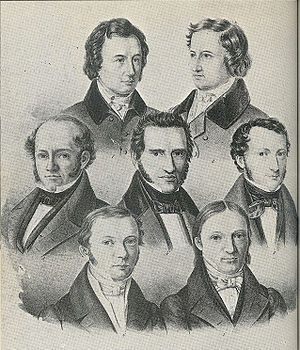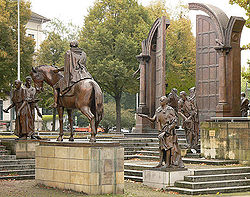
Göttingen Seven
Encyclopedia

Göttingen
Göttingen is a university town in Lower Saxony, Germany. It is the capital of the district of Göttingen. The Leine river runs through the town. In 2006 the population was 129,686.-General information:...
. In 1837 they protested against the abolition or alteration of the constitution of the Kingdom of Hanover
Kingdom of Hanover
The Kingdom of Hanover was established in October 1814 by the Congress of Vienna, with the restoration of George III to his Hanoverian territories after the Napoleonic era. It succeeded the former Electorate of Brunswick-Lüneburg , and joined with 38 other sovereign states in the German...
by Ernest Augustus
Ernest Augustus I of Hanover
Ernest Augustus I was King of Hanover from 20 June 1837 until his death. He was the fifth son and eighth child of George III, who reigned in both the United Kingdom and Hanover...
and refused to swear an oath to the new king of Hanover. The company of seven was led by Friedrich Christoph Dahlmann
Friedrich Christoph Dahlmann
Friedrich Christoph Dahlmann was a German historian and politician.He came of an old Hanseatic family of Wismar, then controlled by Sweden...
, who himself was one of the key advocates of the unadulterated constitution. The other six were the Germanist brothers Wilhelm
Wilhelm Grimm
Wilhelm Carl Grimm was a German author, the younger of the Brothers Grimm.-Life and work:...
and Jacob Grimm
Jacob Grimm
Jacob Ludwig Carl Grimm was a German philologist, jurist and mythologist. He is best known as the discoverer of Grimm's Law, the author of the monumental Deutsches Wörterbuch, the author of Deutsche Mythologie and, more popularly, as one of the Brothers Grimm, as the editor of Grimm's Fairy...
(famed fairy tale and folk tale writers and storytellers; known together as the Brothers Grimm
Brothers Grimm
The Brothers Grimm , Jacob Grimm and Wilhelm Grimm , were German academics, linguists, cultural researchers, and authors who collected folklore and published several collections of it as Grimm's Fairy Tales, which became very popular...
), the jurist Wilhelm Eduard Albrecht
Wilhelm Eduard Albrecht
Wilhelm Eduard Albrecht was a German constitutional lawyer, jurist, and docent. Albrecht was most notable as a member of the Göttingen Seven, a group of academics who in 1837 protested the abrogation of the constitution of the Kingdom of Hanover by Ernest Augustus I.Albrecht was born in Elbing ,...
, the historian Georg Gottfried Gervinus
Georg Gottfried Gervinus
Georg Gottfried Gervinus was a German literary and political historian.-Biography:Gervinus was born in Darmstadt. He was educated at the gymnasium of the town, and intended for a commercial career, but in 1825 he became a student of the university of Giessen...
, the physicist Wilhelm Eduard Weber
Wilhelm Eduard Weber
Wilhelm Eduard Weber was a German physicist and, together with Carl Friedrich Gauss, inventor of the first electromagnetic telegraph.-Early years:...
, and the theologian and orientalist Heinrich Georg August Ewald.
Background
The constitution that Ernst Augustus later opposed came into effect in 1833, while the later King was still heir presumptive to the Hanoverian throne. Historian and politician Friedrich Christoph Dahlmann, who later contested Ernest Augustus' plans to change the constitution to his liking, contributed to the constitution's framing. Additionally, Dahlmann existed as the representative of the University of Göttingen, in the second chamber of the noble court.
German Confederation
The German Confederation was the loose association of Central European states created by the Congress of Vienna in 1815 to coordinate the economies of separate German-speaking countries. It acted as a buffer between the powerful states of Austria and Prussia...
. With William's death, the personal union
Personal union
A personal union is the combination by which two or more different states have the same monarch while their boundaries, their laws and their interests remain distinct. It should not be confused with a federation which is internationally considered a single state...
between Hanover and the United Kingdom ended, and William's brother (Ernest Augustus) took over as ruler of the kingdom of Hanover. Augustus' niece Victoria
Victoria of the United Kingdom
Victoria was the monarch of the United Kingdom of Great Britain and Ireland from 20 June 1837 until her death. From 1 May 1876, she used the additional title of Empress of India....
acceded to the throne of the United Kingdom, but could not inherit Hanover due to the Salic Law
Salic law
Salic law was a body of traditional law codified for governing the Salian Franks in the early Middle Ages during the reign of King Clovis I in the 6th century...
in force in Hanover, which barred females from ruling.
About one month after he succeeded to the throne, King Ernst addressed the matter of the Constitution. He stated that he was not bound by it, as his consent had not been asked to it. He also indicated that it would have been different, or perhaps even non-existent, had he been in power at the time of its composition. He declared that it was his aim and ambition to make the necessary changes to the constitution and rewrite it to reflect his values.
Hearing this, Dahlmann, made an attempt to persuade his colleagues at the University of Göttingen senate
Senate
A senate is a deliberative assembly, often the upper house or chamber of a legislature or parliament. There have been many such bodies in history, since senate means the assembly of the eldest and wiser members of the society and ruling class...
to disapprove of the king's intent to change the constitution, and take some form of action. None of his over 40 different colleagues were willing to support Dahlmann's view and possibly cause public confliction or unrest during ongoing festivities of the 100 year anniversary of the Georg-August University of Göttingen
Georg-August University of Göttingen
The University of Göttingen , known informally as Georgia Augusta, is a university in the city of Göttingen, Germany.Founded in 1734 by King George II of Great Britain and the Elector of Hanover, it opened for classes in 1737. The University of Göttingen soon grew in size and popularity...
.
Protest and aftermath
On November 1 of the same year, Ernest Augustus annulled the constitution. This move was met with political criticism from some German states. The move also provoked Dahlmann to again appeal to the university, and compose a protestation in regards to opposing Augustus' decision. This time, he received a better response, six other professors were now willing to sign as opposers. These six, plus Dahlmann, would become known as the Göttingen Seven. Dahlmann's document was published on November 18 and it met with an explosive influence — the students at the university produced many hundreds, or even thousands, of copies and disseminated them across Germany.The protest's impact forced the king to take action, and the seven defiant professors were questioned before the university court on December 4. Ten days later, the seven were relieved of their posts at the university, and two of them, the Brothers Grimm
Brothers Grimm
The Brothers Grimm , Jacob Grimm and Wilhelm Grimm , were German academics, linguists, cultural researchers, and authors who collected folklore and published several collections of it as Grimm's Fairy Tales, which became very popular...
, were given three days to leave the country. The university recalled the dismissal as a great loss to the university; confirmed in writings about the event during the time.

Liberalism
Liberalism is the belief in the importance of liberty and equal rights. Liberals espouse a wide array of views depending on their understanding of these principles, but generally, liberals support ideas such as constitutionalism, liberal democracy, free and fair elections, human rights,...
republic
Republic
A republic is a form of government in which the people, or some significant portion of them, have supreme control over the government and where offices of state are elected or chosen by elected people. In modern times, a common simplified definition of a republic is a government where the head of...
in Germany.

